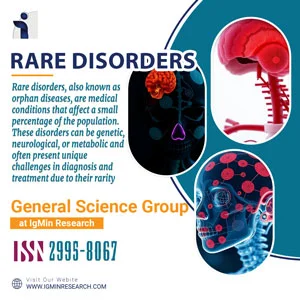About
Publish Your Research on Rare Disorders with IgMin Research
Are you working on groundbreaking studies related to rare diseases? At IgMin Research, we welcome high-impact submissions to our Rare Disorders Journal, providing a global platform for researchers, clinicians, and scientists dedicated to advancing the understanding of rare medical conditions.
Why Submit Your Rare Disease Research Article?
Submitting your research to a reputable journal ensures your findings reach the right audience. Here’s why you should submit your rare disease research article with us:
-
Fast-track peer review and expert editorial evaluation
-
Wide international visibility among the rare disorders research community
-
Supportive team guiding you through each step of publication
Take the first step with our quick submission portal.
Rare Disorders Publishing Guidelines
Before submitting, we recommend reviewing our Rare Disorders Publishing Guidelines to ensure:
-
Your manuscript meets formatting and ethical standards
-
All data and figures are properly referenced
-
Conflicts of interest and informed consent are disclosed
Our journal focuses on a wide range of rare disorders, from genetic syndromes to ultra-rare conditions. Whether you're submitting a case study, clinical review, or original research, we provide a professional and ethical publishing environment.

Why publish with us?
Global Visibility – Indexed in major databases
Fast Peer Review – Decision within 14–21 days
Open Access – Maximize readership and citation
Multidisciplinary Scope – Biology, Medicine and Engineering
Editorial Board Excellence – Global experts involved
University Library Indexing – Via OCLC
Permanent Archiving – CrossRef DOI
APC – Affordable APCs with discounts
Citation – High Citation Potential
Which articles are now trending?
Research Articles
- Screening for Sexually Transmitted Infections in Adolescents with Genitourinary Complaints: Is There a Still Role for Endocervical Gram Stains?
- Balancing Act: Exploring the Interplay Between Human Judgment and Artificial Intelligence in Problem-solving, Creativity, and Decision-making
- Prevalence of Diabetic Retinopathy among Self-reported Newly Diagnosed Diabetics
- Effect of Rainfall on Water Parameters in Recreational Lakes in Heidelberg, Germany
- Effect of Additive Manufacturing Parameters on 316L Mechanical and Corrosion Behavior
- Designing a Compact High-precision Positioner with Large Stroke Capability for Nanoindentation Devices
Advertisement







